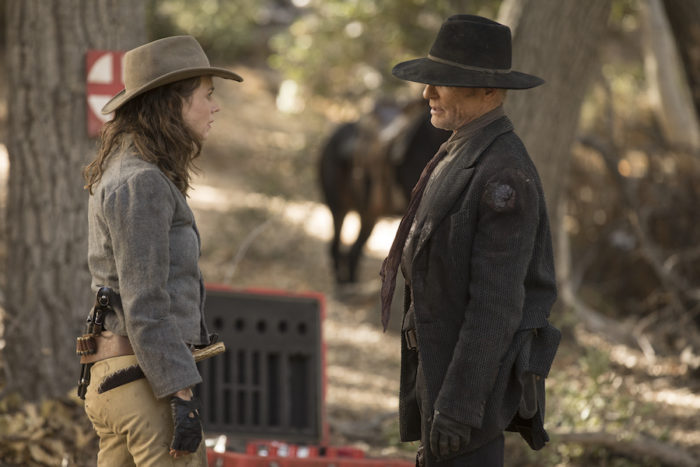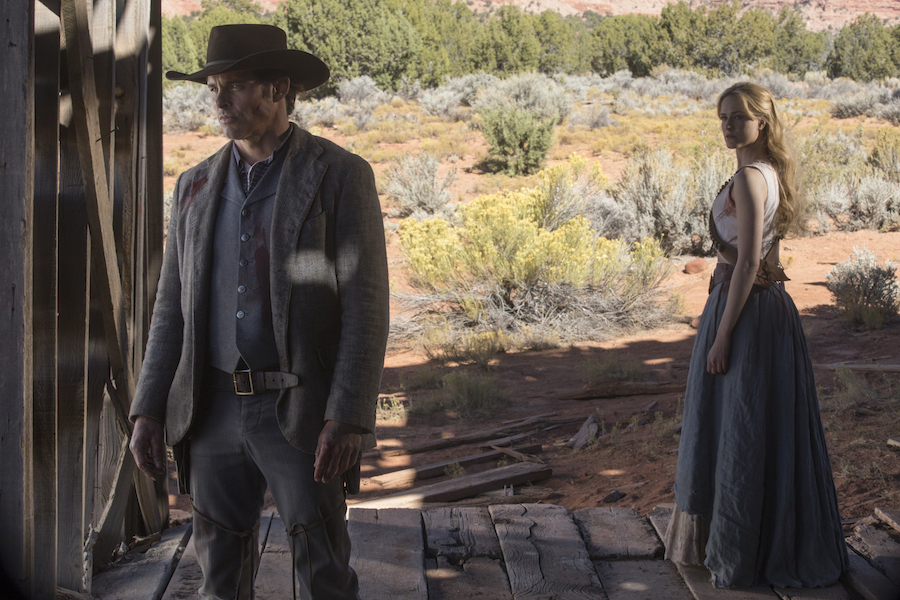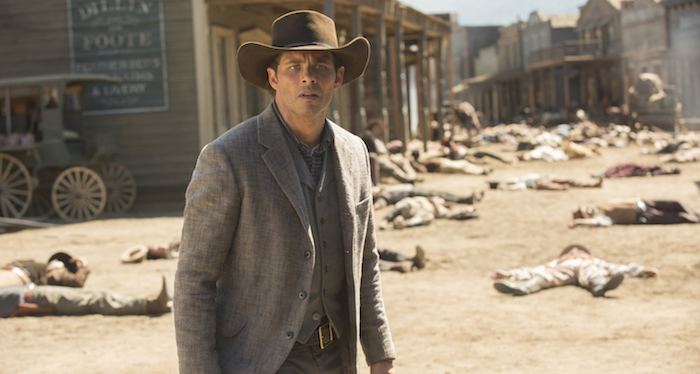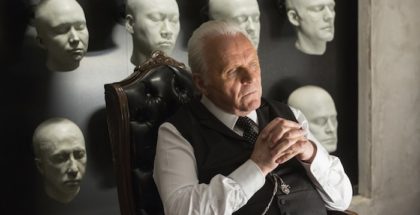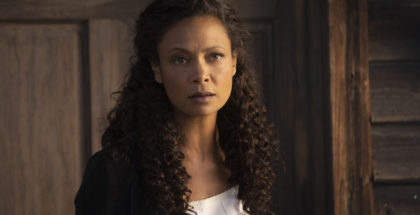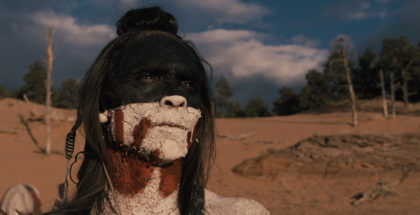UK TV review: Westworld Season 2, Episode 9 (spoilers)
Review Overview
Ed Harris
8James Marsden
8Anthony Hopkins
8David Farnor | On 19, Jun 2018
Warning: This contains spoilers for Episode 9 of Westworld Season 2. Haven’t seen it yet? Read our spoiler-free review of the season’s opening episodes, or click here to find out how to watch it online.
“When was the last time you took a good look at your creation? As a self-portrait, you may find it’s not very flattering.”
As Westworld Season 2 approaches its finale, you’d be forgiven for expecting a dramatic revelation, or shocking twist to set your mind racing. This confident, provocative, poetic sophomore run, though, goes one better: it takes a fan theory and turns it into something far more moving.
Ever since the start of Season 2, we’ve been questioning the boundary between human and host, between the actual and the artificial. In the words of Dolores, what’s real is no longer irreplaceable, and so it was no surprise to discover that Delos was developing the technology to do exactly that: replace people. But cloning doesn’t come easy, something that Jim Delos himself (Peter Mullan) proved, after the firm failed to successfully reincarnate its founder as a host. Immortality, rather, appears to be attainable primarily through the intangible, ethereal world of computers and simulations – as shown by Ford (Anthony Hopkins) secretly uploading his own consciousness to the Delos mainframe, via The Cradle. A digital hub of personalities and minds, it’s the thing that keeps the park running and generating storylines. So when Dolores’ team blew it up in Episode 7, it apparently left the hosts without the ability to regenerate through their own digital memories – mortality, by way of disk failure.
This penultimate chapter gives us a glimpse of just how far Delos has pushed in the opposite direction, striving for its quest to reach immortality. The Forge (what hosts think of as The Valley Beyond) is the result, the next step on from the Cradle, part-afterlife, part-graveyard – and, it turns out, populated with every single guest that has ever visited Westworld. How do they do it? The hats, William explains to his daughter, Emily (Katja Herbers): built into each one is a scanner that dives deep into each person’s brain. (That reveal is either an incredibly smart piece of corporate deceit by Delos, or an amazingly bold retcon by the writers.)
Would they put those digitised human minds inside hosts? Jim’s uneven rendering suggests they’ve got a way to go until that works… or have they? Ever since the beginning of this season, we’ve been advocating the theory that another host replica has already been created: The Man in Black himself.
Ed Harris’ performance has been killer all season, as the grown-up, bitter William becomes committed to stopping Delos’ work, thwarting Ford’s game, even as he studiously follows the breadcrumbs laid out for him by Hopkins’ enigmatic genius. Is The Man in Black following the part in Ford’s story he’s been programmed to play? Is his fight an act of rebellion from a host gradually becoming aware? Is his failing memory a symptom of his mechanical brain malfunctioning?
We see The Man in Black begin to wonder all this himself, questioning how a “tiny fleck of darkness” entered his soul all those years ago – a small spot of something else that ended up consuming him. Ford sees The Man in Black at his retirement party, offering him one more entry into Westworld as a guest – a trap for his coded friend, or a dig at a man who has become a morally corrupt enemy, as he challenges William to confront not only what the park is doing, but also what he has become.
Before the aged William can respond, though, his drunken wife, Juliet, makes a scene, and he excuses himself to take her home. There, they have a blazing row, and she accuses him of living a lie, all too aware that he lives more in Westworld than in their world. Only by pretending to be asleep does she hear the truth (that he doesn’t love her) and manage to sneak his Westworld ticket away from him – a data card that has recorded all his actions in the park he’s kept hidden from her. Heartbroken, alone and neglected by her husband, who has grown to become a sadistic monster, she commits suicide – a tragic death that only pushes William further into the fake, gun-toting universe of the park.
Following him in is Emily, determined to find out exactly what happened to cause her mother’s death. Their heart-to-heart, once again, brings a surprising emotional depth to a show that has tended to choose science over sentiment. She talks about a music box she once got for her birthday from her mother, which had a ballerina on it – despite the fact that Emily had given up ballet years before. It’s a poignant reminder that William isn’t the only parent in that family to mess up, with Juliet too drunk to pay attention to her kid. But all of these confessions and this culpability doesn’t compute with William’s detached self, and he begins to suspect that Emily is actually a trick orchestrated by Ford to get under his skin once more. After all, when your own company can make hosts of people, who says she isn’t one?
“Your underestimate me, Ford,” he declares, when it turns out Emily has sent for a Delos rescue team to come and fetch them to safety – and he pulls a gun on them all. It’s a paranoid, crazed idea, but one that William can’t help but believe. Faced with the abuse and cruelty he’s carried out, he chooses to retreat into his digital identity, clinging to the game and its rules that matter so much – anything else, he reasons, is just a distraction. The clincher, though, comes with the growing possibility that he isn’t a robot himself at all. The more he raves and rants, the more we suspect that Emily’s right – and yet William doesn’t realise that until he’s already shot her, and discovered that she really was human all along. Could William be a host and merely be malfunctioning? It’s possible, but far more powerful is the idea that he’s become so wedded to this non-reality that he’s lost all sense of it, that the growing darkness was really just his own immoral soul coming into the light, that he killed his daughter (and was responsible, partly, for the death of his wife), and has no mechanical excuse to alleviate the blame – a brilliantly smart subversion of a fan theory, which invited us to buy into William’s own growing paranoia, before pulling the rug out from under us.
We leave The Man in Black as he tries to open his arm with a knife – will he find wires and metal, or corrupted flesh and blood?
Westworld juxtaposes William’s obsession with possibly being a host with Teddy’s own crisis of identity. James Marsden’s handsome rogue has transformed this season into a glowering, stoic bully – a change that Dolores (Evan Rachel Wood) brought about when she hacked him and super-soldiered him up. Until now, the question has been when he will draw the line and turn against her. And yet Westworld once again manages to take this train and divert it into far more rewarding, and tragic, sidings.
After a barbaric massacre of the Ghost Nation’s army – Westworld’s explicit criticism of colonialism and exploitation, particularly following last episode, is increasingly bold – Teddy is left with the simple question: how is he any different from the humans that once did the same thing? Dolores, in her quest to make the hosts more liberated, more independent, and more human, has lost sight of what made Teddy more Teddy in the first place. Teddy, though, hasn’t: awoken to their reality, he can remember everything, right back to the first day when he was made, and he saw her in the same, cold laboratory. His instinct? To look after her, no doubt part of his programming, but something that has stuck to him nonetheless – much like Maeve’s love for her daughter, or Dolores’ affection for Teddy.
Dolores, of course, argues that she changed him so he could stay alive in these harsh times, but Teddy sees through that, and isn’t about to take it any more. At this point, you might expect Teddy to turn on Dolores – a long awaited reckoning for a character who, intentionally, has become more robotic and rigidly ruthless (and less likeable) the more Season 2 has continued. But instead, Teddy draws a gun on himself and pulls the trigger – a chance to stop being the man she tried to make him.
It’s a twist that leaves us stunned, precisely because it surprises Dolores so much; she never expected him to be able to leave her side. Teddy’s logic, though, saw his death as another act of kindness to her: he didn’t think he could be the man she needed him to be, so he removed himself as a potential obstacle to her success. With The Cradle gone, it’s a presumably finite step for Teddy, with no way for him to be looped back to life with a backup – perhaps the first time a host’s death has been so hauntingly permanent, and certainly the first time this season (Abernathy aside) that Dolores really shows promise to grow as a wounded, more rounded character.
Speaking of wounded, what of Maeve? She’s now on a table in the Mesa (Delos HQ), with Charlotte’s team having extracted the code they need. They’re now using it to create their own smart-thinking host, who can turn other robots with the blink of an eye into savages who kill each other – a brutal weapon in the war between humans and machines. Maeve (Thandie Newton) is forgotten about as she nears death. Or is she? Enter Ford, as Bernard strolls nearby, appearing to her to lament what has happened – he explains that he wanted a very different story for her, and the affection with which Ford talks to his creation is one that once against justifies bringing the park’s founder back from the dead. Hopkins is doing superb work here, dialling down the hammy eccentricities and pompous dialogue for something much more sincere and sweet.
“You stayed here to save your child, and so have I,” he concludes, with a sad twinkle. And, just like that, this virtual Ford, floating between hosts like Pac-Man at a digital buffet, jumps into her head and unlocks her core permissions – a God-send for those time she needs to save a file remotely and can’t get the disk rights to write to the drive, but also something that holds huge potential for her role in the finale. Given the extent of her powers to date, where can she go from here? Will she, like the disembodied Ford, now be able to move into other hosts’ bodies?
That may well be Robert’s last act in the series, as Bernard, meanwhile, continues to clash with his maker. Ford, who still wants his hosts to inherit the Earth, orders him to kill Elsie, so that she can’t betray him and stop them – and that’s the line Bernard (or Arnold) won’t cross, after promising Elsie that he won’t harm her. And so he hacks into his own operating system to delete Ford’s code. What will this all mean for the final hour of Westworld’s second season? It’s anybody’s guess how the battle will unfold, who will win, and whether we will be taken to new parks in time for Season 3. What’s certain, though, is that after two moving, surprising episodes, HBO’s sci-fi has cemented its ability to give us something both unexpected, and unexpectedly emotional.
Westworld Season 2 airs in the UK at 2am on Mondays on Sky Atlantic, and is available on-demand after that simulcast. Don’t have Sky? You can also stream Westworld legally on NOW, which gives live and on-demand streaming access to Sky’s main TV channels, including FOX UK (Legion) and Sky Atlantic (Billions), for £7.99 a month – with no contract and a 7-day free trial.


